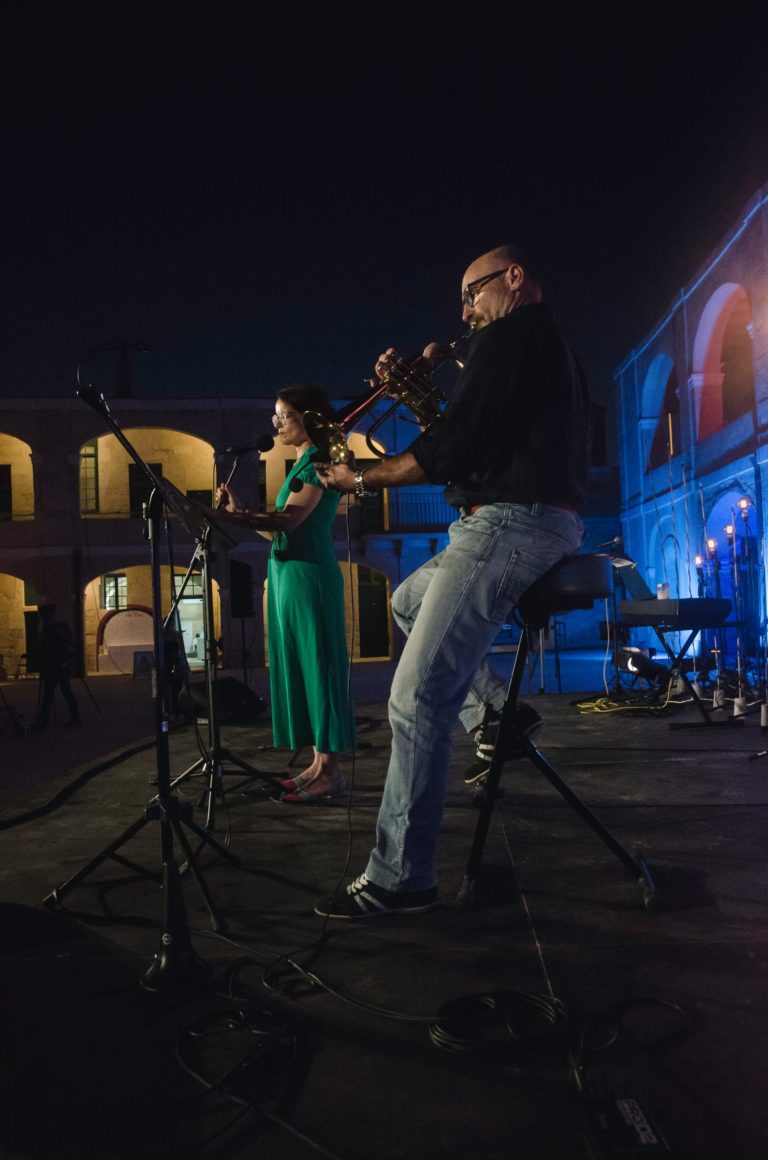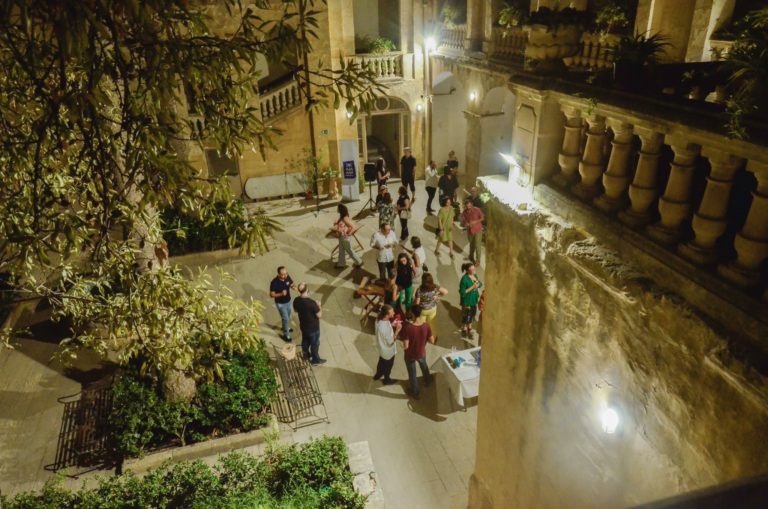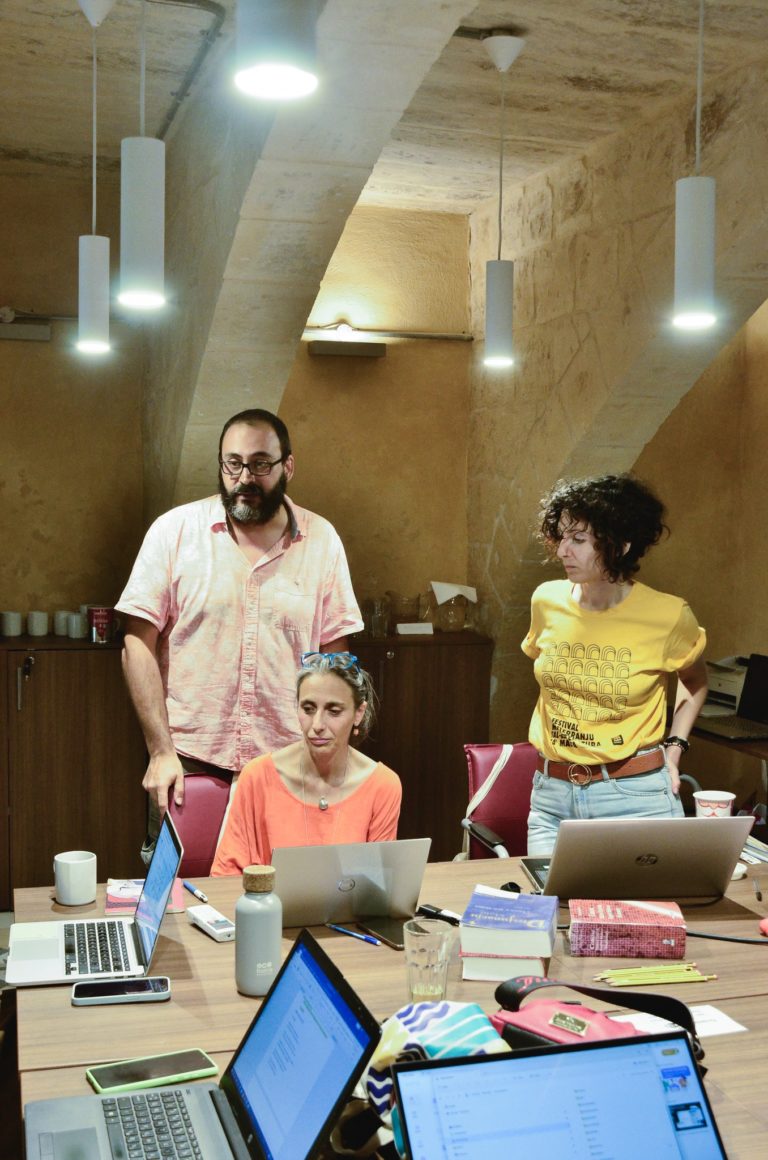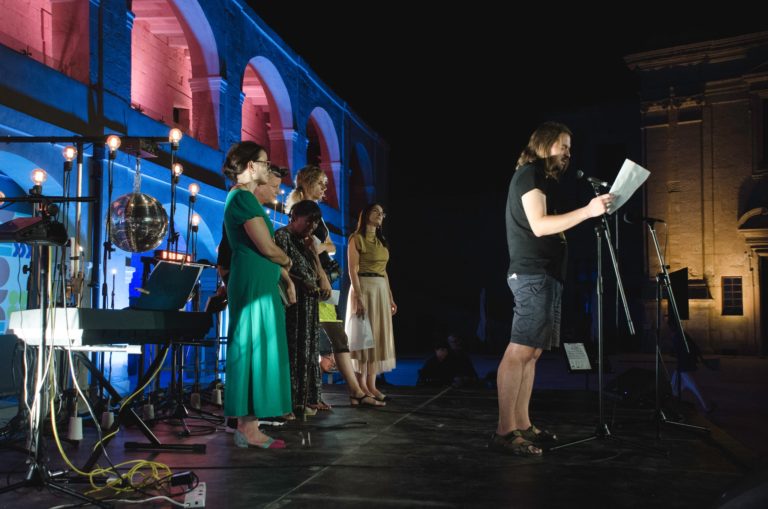Authors: Leanne Ellul & Jean Paul Borg
In a country where language itself carries the weight of survival, Malta’s literary organisations work quietly yet relentlessly to keep words alive. Small, voluntary, and often precariously funded, these groups are not only shaping Malta’s literary landscape but also resisting a future where art is dismissed as unnecessary. Their work is fragile but vital, sustained by dedication and independence, more than certainty.

Claudia Gauci’s poetry set against a backdrop of music – © Viriginia Monteforte
“A Study of Losses”
The year is 2100. Malta is scorched and stripped of its beauty. People have survived natural and man-made disasters only to live monotonously—they work, eat, sleep, and repeat. They listen to listening and look without reading. All the theatres have closed down; there are no music clubs left, no concert halls, no dance floors, no open mic spaces. The arts have been deemed unnecessary by those in power. “Well-being” is a phrase one can no longer look up in the dictionary.
This scenario recalls The Memory Police by Yōko Ogawa, where objects and their names vanish, erased by authoritarian control, as a writer struggles to remember. Judith Schalansky’s An Inventory of Losses also explores memory and extinction through vanished objects. Similarly, Beirut’s album A Study of Losses, inspired by Schalansky, explores impermanence and cultural memory, turning loss into hauntingly beautiful music.
These works of art show how the arts themselves reflect loss but also act as a warning of what might lie ahead. Memory Police aren’t roaming our streets yet. While we hang on to the arts—for many some as a luxury, for others as an essential pleasure, and for some as a way of life—we do our best to reach different communities while reinventing ourselves and redefining culture.
Malta, Where?
Malta, a small Mediterranean island between Italy and Libya, spans just 316 km² but is one of the world's most densely populated countries. Its strategic location led to centuries of foreign rule, shaping our very only language—Maltese—which is a blend of Arabic, Sicilian, Italian, and English. Maltese adopted a standardised writing system in 1934 and recognition as a European Union language in 2004; thus it remains a young language alongside its developing literary culture.
Today, despite what the Constitution of Malta states, not every citizen is bilingual across all language skills. Some know neither Maltese nor English; others know Maltese but not English, or English but not Maltese. As a result, the Maltese population has varying degrees of proficiency in one or both of these languages.
Much like Maltese itself, Malta’s art scene is always evolving. It stands against a heavy backdrop of colonisation, linguistic tension, and cultural layering. For centuries, Maltese was considered unfit for literary or artistic expression. As Oliver Friggieri notes in “Points of contact between Italian romanticism and Maltese literature” (1992), to understand the Maltese literary spirit, “one should only find it obvious to include, and give causative prominence to, the said Italian-oriented Maltese production” as the preliminary phase of its cultural history—an era shaped by social stratification and “extraliterary motives” that made it “socially dishonourable” to use Maltese in artistic contexts. Post-independence (1964), however, marked a turning point: a cultural awakening saw local creators embrace Maltese identity, voice, and style.
Today, Malta remains a place of contrasts, simultaneously open to connections yet surrounded by the sea, proud of its unique language while conscious of its colonial legacy, rooted in tradition while rapidly embracing technological innovation.

A Meet & Greet held in a historic Mediterranean building – © Viriginia Monteforte
Literary NGOs and How They Operate
As of April 2025, 1,899 NGOs were registered with the Commissioner for Voluntary Organisations, 181 of which are focused specifically on the arts. Out of these, there are the following key literary NGOs:
- L-Akkademja tal-Malti, which promotes the Maltese language at a national level;
- Għaqda tal-Malti – Università, a student-led organisation focused on Maltese language and literature within academic settings;
- PEN Malta, a literary and human rights organisation that strives for freedom of expression and supports writers at risk;
- Malta Entertainment Industry and Arts Association, with a literary subcommittee that addresses challenges faced by writers, publishers, and other stakeholders;
- HELA Foundation, an autonomous platform working to foster excellence across the local literary sectors; and
- Inizjamed—our NGO—which is a secular, non-partisan organisation that acknowledges that every generation must seek to create its own language while responding to realities of its day and looking beyond them.
The common denominator is that they’re voluntary. They are run by individuals—some of them working in multiple NGOs—driven by a shared passion for language, literary arts, and culture in general. This gives them a unique vitality and independence, allowing for creativity and flexibility. However, this also presents its challenges.
Firstly, they operate with limited resources, be they human or financial to mention but a couple. Their members often struggle to dedicate sufficient time to the organisations, as they are balancing full-time jobs, and in many cases, their own artistic practice. Long-term planning also becomes difficult. Most organisations operate by managing multiple projects, with one project leading to the next. Yet despite these constraints, their contribution to Malta’s literary and cultural life remains profound and essential.
Despite limited private investment in the arts and a strong dependence on state entities, artistic activity continues to find ways to grow, adapting as it goes along. These NGOs are helping shape a new literary landscape that is conscious of its roots but also aware and in touch with what is happening abroad, one that navigates between heritage and innovation, inward reflection and outward dialogue, as Malta redefines its place in the cultural map and tries to pitch its voice to foreign literary audiences.

A more reflective atmosphere during a translation workshop – © Viriginia Monteforte
The Malta Mediterranean Literature Festival
As Inizjamed, among other projects, we annually organise the Malta Mediterranean Literature Festival that is now entering its 20th edition. At the end of every summer, we bring together novelists and poets from across the Mediterranean and beyond. This year we are also broadening the literary experience by inviting non-fiction writers and writers for theatre. Authors translate each other’s work, with the help of other translators. Then, audiences gather to experience readings in multiple languages, music, and conversations, that forge strong cultural exchange.
The festival is mostly a celebration of literature. However, it’s also a space where languages meet, where artistic and political borders blur, and where committed, socially conscious writing is given centre stage. It is rooted in the belief that literature allows us to dialogue; we consider translation as our language, and also as a way of imagining a different world, and a means of creating connections across divided shores.
The festival is partially funded by a grant from the state through Arts Council Malta, and also through European funding bodies. In the past we have worked closely with Literature Across Frontiers and lately we have entered into a collaboration with Versopolis. Companies sometimes offer small contributions through Corporate Social Responsibility schemes, but these are insufficient to stabilise the festival's precarious situation. Rather than just focusing more on programming, Inizjamed has to primarily work with a shoestring budget and juggle aspects like locations and accommodations, since some have become too expensive. To this effect, this year we adopted a new model that seeks partnerships and collaborations with various venues and entities that enables us to create more focused events for smaller audiences as part of the bigger festival. It is also an attempt to deepen the connections with audiences the festival already has.
The administrative part is becoming ever more burdensome. Like Inizjamed itself, the festival is almost entirely volunteer-driven. We have no full-time staff and depend heavily on the goodwill, time, and energy of a small, dedicated team.

A closing reading from a past edition of the festival – © Viriginia Monteforte
A Balancing Act
Funding, as discussed before, comes primarily from Arts Council Malta and a three-year grant that up till now has been securing us with peace of mind and time to plan ahead. While such funding is ever so vital to an NGO like Inizjamed, it is not enough to make the festival sustainable on a long-term basis. Although the festival is ticketed, the revenue it generates is not sufficient to sustain the whole organisation fully independently. We would love to grow, to plan further ahead, to build more robust partnerships, but without permanent staff or consistent, independent funding, this remains a challenge.
Another change the festival has gone through in recent years is ticketing. It was a step toward some form of sustainability—but this too comes with its own set of limitations. Malta is a small island, and literature appeals to a relatively small segment of the population. Despite our efforts to make the festival as accessible and inclusive as possible, literature is still often perceived as elitist or niche on one hand, and educational and exam-driven on the other. This is further compounded by Malta’s low national reading rates. According to the latest PISA 2022 results, Maltese 15-year-olds score well below the OECD average. This performance reflects the scoring in previous assessments. In 2022, 43% of boys and 29% of girls failed to reach the minimum proficiency level in reading. These figures reflect deeper systemic issues, and they affect everything from education to how literature is perceived and consumed.
At times, literature feels at risk of being axed from the national curriculum to make way for other subjects deemed more 'practical' or economically driven—a short-sighted move that overlooks the deep, long-term value of critical thinking, empathy, and cultural literacy. This means that expanding our audience is not just a marketing challenge but a cultural one.
Even the most basic elements of a literary festival—like having a bookstall can be difficult to manage. Local publishers are under considerable strains, facing limited resources and small markets, and are rarely in a position to invest in events like ours. Yet, we persist. Because we believe that literature, even if not always popular, is essential. We are convinced it can foster empathy, open dialogue, and provoke thought in ways few other forms can. For Inizjamed, organising a literary festival in a society where reading is often undervalued, is an act of cultural resistance.
End/and
Whether the present circumstances will lead to an end, or to an and (that is, continuation), remains unknown. The experiences of others, such as the Station 21 Literature Festival in Poland, have taught us that in order to survive, festivals must reinvent themselves. However, reinvention alone does not guarantee that a festival will continue to take place. As the only literary festival in Malta, the Malta Mediterranean Literature Festival continues to bring together established voices—some of whom go on to win prestigious accolades such as the Nobel Prize and the Pulitzer Prize—while also giving Maltese authors a platform to share that same stage. For all of this to survive, the festival must secure sustainable funding models. Even in countries that value literature more than ours, festivals cannot be funded solely independently—rather co-dependently. Additionally, full-time staff and permanent premises would undoubtedly help Inizjamed’s work toward more stable financial support. But this can only succeed within a broader context of increased investment in cultural education.
Published on September 9th, 2025
About the authors:
Leanne Ellul (b. 1989) writes poetry and prose, and has published works for both adults and children mainly in Maltese but also in English. She was named Best Emerging Author in the 2016 National Book Prize, and her works for children have garnered various awards. Ellul won first place in the national competition for theatre writing and the Novel for Youths Prize 2014 with her novel Gramma that was also translated to English and published in Arabic. In 2023, she won the prize again with another novel for youths. L-Inventarju tal-Kamra l-Kaħla, her first poetry collection, was published in 2020. Her second collection, Bjuda, is part on an interdisciplinary project centered around the colour white. Her latest collection is entitled Il-Manifest tas-Siġar. Ellul lectures in Maltese language and literature and is active in NGOs organising a number of festivals and open mics. She is the artistic director of Inizjamed.
Jean Paul Borg (b. 1980) is a Maltese author and translator who discovered his literary calling through the Malta Mediterranean Literature Festival and then blogosphere. Formerly working for 20 years in a world bank, he shifted into volunteering and literary pursuits, translating Amiry’s Sharon and My Mother-in-Law and publishing his own short-story collection Mhux Nies (2016), exploring themes around migration and social identity. He followed by another translation of Amiry’s My Damascus, and then by a novella, Salib. He is an active member of NGOs Inizjamed and HELA Foundation. Recently, he has been researching the portrayal of the father in contemporary Maltese literature.